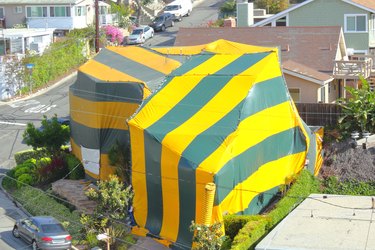
If you've tried traps and poison and rats are winning the battle, you might consider fumigation for rat removal. This is an extreme step. Not only is it costly but it also results in decomposing rat carcasses in your walls ... ewww. Also, it's not recommended by pest control experts.
The best way to avoid developing a serious rat problem is to control their entry points and make your home unattractive to them, but once you have an infestation, you'll likely need to resort to traps followed by poison. Fumigation rarely enters the picture.
Video of the Day
Video of the Day
Start With Traps for Rat Control
The key with rodent control is to address the problem as soon as you are aware of it. Rats produce about 100 offspring each year, each of which will start producing its own offspring at about 2 months old. Within a few months or even weeks, that sole rat you saw late one night running across your kitchen can turn into hundreds and then thousands of rats.
For existing rat infestations, start with traps to address the immediate problem. Be careful to place the traps where pets and children cannot access them. For both the common Norway rat (brown) and roof rat (black), baits, such as peanut butter, sweet berries, and fruit, are effective. A simple snap trap is the most cost effective and easy way to catch a rat. Then, immediately dispose of it, as rats carry diseases that can create health risks in your home.
Poison for Rat Control
Setting out poison for rats is certainly effective and may be necessary as a complement to traps if the rat population in your house is overwhelming your efforts. For severe infestations, experts recommend hiring professional pest companies because rat bait is dangerous to humans and other animals, and its misuse by nonprofessionals can result in a catastrophe.
Further, rodenticides used to target rats are highly regulated by the Environmental Protection Agency so that manufacturers can sell only limited types of poison directly to the public, and these must be prepackaged in ready-to-use bait stations. Lack of access to more effective poisons can curtail the efficacy of this method for the average consumer.
Close Off Their Entry Points
While you are addressing the immediate problem, consider your long-range strategy so you can keep these pests from entering your home in the first place. There are reams of details and ideas available from experts on how to rodentproof your home, but there are some basic strategies for dissuading rats from entering your house.
First, ensure that there is no food available, which might entail enclosing your trash or covering it with a tight cover and putting any bagged food, such as cereal, nuts, or fruit, into tightly sealed containers. Don't forget about those bags of pet food.
Next, address how the rats are getting in. Branches that hang over your roof and provide a diving board for rats should be trimmed back. Cracks where your plumbing enters the house might be entry points as might gaps under your roof. Yard debris can act as excellent hiding and nesting spots.
A Non-Option: Fumigation for Rat Removal
It's unlikely you'll find a reputable pest control company that will recommend or employ tent fumigation for rat control. In fact, experts emphasize the need to first rid a structure of rodents before tenting.
Fumigation, usually for wood-destroying insects or other bug infestations, will kill all rats, mice, and any other mammals inside the structure, so yes, it would technically work to tent your house and fumigate it. However, it would leave multiple dead animals throughout your structure, not just visible inside where you would need to bag and dispose of them but also within the walls and crawl spaces that you cannot see or access. These would soon begin to decompose and would not only smell but harbor viruses and bacteria.
Plus, fumigation is pricey and labor-intensive. It's used only as a last resort for carpenter ants or termites, not usually for rodents. Most cost estimates place tent fumigation in a range of $2,000 to $8,000 for the average-size home, with a cost of $1 to $4 per square foot.